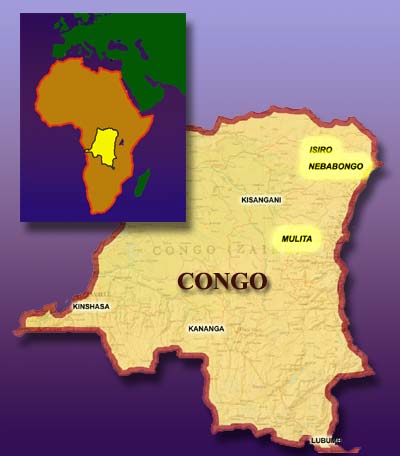Calm returns to east Congo after four days of fighting
 Nairobi, Kinshasa - Calm has returned to the east of the Democratic Republic of Congo, a spokesman for the United Nations peacekeeping mission said Thursday after four days of fighting that saw Tutsi rebels come close to taking the city of Goma.
Nairobi, Kinshasa - Calm has returned to the east of the Democratic Republic of Congo, a spokesman for the United Nations peacekeeping mission said Thursday after four days of fighting that saw Tutsi rebels come close to taking the city of Goma.
General Laurent Nkunda, leader of the National Congress for the Defence of the People (CNDP), Wednesday evening announced a unilateral ceasefire to "prevent panic in Goma."
The UN peacekeeping mission in the DR Congo (MONUC) said that the ceasefire was holding.
"There has been no new fighting as of last night," MONUC spokesman Madnodje Mounoubai told Deutsche Presse-Agentur dpa.
UN helicopter gunships and armoured vehicles supported Congolese troops near Goma, the capital of North Kivu province, over the past few days as they struggled to contain Nkunda's forces.
The Congolese army went into full retreat Wednesday, joining tens of thousands of refugees streaming toward Goma after the CNDP took control of small towns near the city.
Silvia Holten, spokeswoman for charity World Vision, told dpa Wednesday that Goma was in state of panic as Nkunda's troops converged.
Congolese armed forces were mixed in with the refugees and were reportedly panicking and firing in the air to get civilians out of their way.
The United Nations on Wednesday ordered all local aid agencies to evacuate their staff from Goma as Nkunda's troops approached the outskirts of the city.
There were reports that the rebels had entered Goma, but Mounoubai said that the town was secure.
"There was some firing inside Goma, but as of now Goma is under MONUC control," he said.
Despite the ceasefire, Mounoubai said that the movement of refugees was continuing.
"It (refugee movement) is going in both directions," he said. "People from outside are fleeing into Goma and people inside Goma, who don't know what is going on, are fleeing."
The UN peacekeeping mission in Congo has engaged the rebels over the past few days, pounding their positions with gunships, but there forces were stretched to the limit
Alan Doss, the top UN envoy to the Democratic Republic of Congo, appealed Tuesday for more soldiers. Further troops have yet to be committed.
Of the 17,000 UN peacekeepers in the sprawling country, around 6,000 are deployed in North Kivu.
The CNDP and other groups in January signed peace accords designed to end sporadic clashes that occurred in 2007, four years after a war that began in 1998 officially ended.
But the CNDP and government soldiers have been involved in repeated clashes in the eastern provinces of North and South Kivu since late August.
Congo's government has accused neighbouring Rwanda of amassing troops on its border with a view to backing Nkunda, who says he is fighting to protect Tutsis from armed Hutu groups.
There were some reports of firing across the Rwandan border on Wednesday, but they could not be verified.
Many Hutus fled to Congo after the 1994 massacres in Rwanda when Hutu militia and military killed an estimated 800,000 Tutsis and moderate Hutus in the space of a few months.
The UN Security Council condemned the fighting and called on Rwanda and Congo to defuse tensions.
The UN said about 250,000 civilians have fled the fighting since August, bringing the number of refugees in North Kivu to almost 1 million.
"The numbers of internally displaced are already huge, and it looks like it is going to grow," UN spokesman Ron Redmond said.
Doctors Without Borders, which said that on Sunday alone it treated 70 war wounded, warned Thursday that the situation was still "extremely volatile" and said that the refugees urgently needed shelter, food and clean water.
Many of those who have fled to the environs of Goma were already refugees from other areas, where they lived in camps near towns engulfed by the last few days' fighting.
More than 5 million people are estimated to have died as a result of the 1998-2003 war in the resource-rich nation, most of them from hunger and disease.
The conflict is often referred to as the African World War, owing to the large number of different armed forces involved. (dpa)